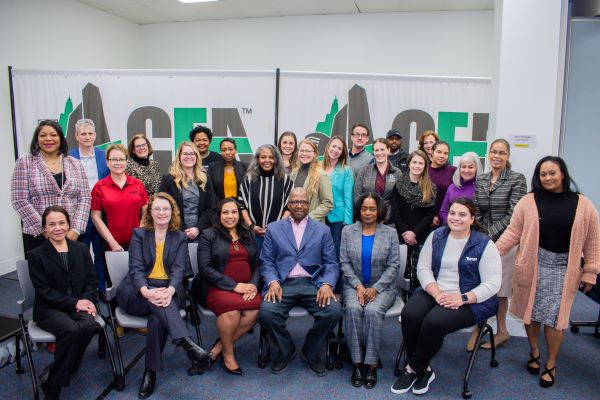CEA Women History Month Workshops Focused on Advancing Gender Equity in Construction
Construction Employers Association (CEA) wrapped up their celebration of women in construction during Women’s History Month with two workshops that focused on how to advance women in the industry.
Kimberly Chapmon-Wynne, MBA, founder of Mosaic Insights Consulting, conducted a one titled “Gender Microaggressions: How Women Can Ally For Each Other” at CEA on March 23.
“We all have biases. We all commit microaggressions,” says Chapmon-Wynne, whose discussion focused on educating attendees about how microaggressions show up in the workshop across demographics. Microaggressions are committed within the same gender and races all the time. She says sometimes responses are a result of simply lack of knowing and she talked about the intersectionality between and gender.
“A microaggression toward an African American woman can look different than one towards a white woman,” Chapmon-Wynne says. She also discussed how to respond to microaggressions. Interestingly, while conducting the workshops, the world witnessed microaggressions playing out live during the Supreme Court Justice confirmation hearing.
But, the biggest question among the participants became how do we get more men to the table to have this discussion?

The need for men to be a part of these conversations is critical because in an industry, with few women and few women in certain positions, you’re not going to thrive and grow, says Chapmon-Wynne.
“If you want to stay viable, you need to ensure that women and members of other races want to come into the industry,” she adds. A handout issued by Chapmon-Wynne stated that $64 billion is the annual cost of bias to organizations.
One woman said she remains in the construction industry because it’s her livelihood. Another stated, “I’m ready to go. I can’t take it anymore.”
Another part of the workshop was about explaining and understanding “subtle acts of exclusion.”
“What does it mean when women are not invited to the table?” Chapmon-Wynne asks. “Those are subtle acts of exclusion.”

The celebration of women in construction closed out with the Dale Carnegie workshop, “Advancing Women in Leadership” on March 30. In this program, the discussion centered around the ways women can increase visibility and influence in organizations and industry.
Attendees ranged from a student intern (still in college) to a civil engineer with 38 years of experience.
“I believe that each woman who attended left with an action plan of things they are going to be more aware of and intentionally building on,” says Marilee MacAskill, area director for Dale Carnegie Training in NE Ohio.
“And I hope that they will seek out the training, mentors and resources they need to create the career they desire,” she adds.
MacAskill says it’s important for women to seek leadership roles in an industry such as construction because research has shown that diversity of the sexes as well as race, ethnicity, etc. within any organization or industry can enrich the company’s productivity, idea-flow, process innovation, and overall efficiency.
“Women live in these structures that we are building,” she says. “If we live there, we should play a part in building it too!”

When asked what type of resources are needed for women to successfully assume leadership roles in a field like construction, MacAskill said training like the kind offered at CEA and by Dale Carnegie, mentorship (by both male and female leaders) and opportunities as well as a willingness to work and get the job done.
“In most organizations, it requires initiative - taken by the management and intentionally implemented to recruit and retain strong women leaders,” says MacAskill. “Construction seems to lag behind many other industries but the women who were in attendance at these workshops are the kind of women who will help propel their organizations’ success.”
Jacqueline A. Jacob, project manager at Great Lakes Construction attended both the microaggression and advancing women in leadership workshops and found both of the educational, while providing different messages.
“With microaggressions, I do truly believe a lot of things said or done are unintentional and I feel a good way to fix this would be to get real life stories and examples out there for people to see,” she says.
Jacob would like to see, as a next step, bringing more people to the table on this topic. “A lot of good examples were mentioned in the meeting,” she adds.
Jacob advises women in the industry to be confident in what you say.
“Don’t be afraid to insert yourself into opportunities or issues but be able to accept constructive criticism. Remember that what you say can come across differently to other people than you intend it to, this goes for men too. Lastly If you are good at your job, the right people will recognize it and provide you with opportunities.”

Keri Abel, M.S., B.S., CPT, Health & Wellness Coordinator at Precision Environmental Co. says being a successful woman in the construction industry requires “the want” to be a trailblazer.
“I’ve learned, in my short time in the industry, that women in the field tend to have to prove themselves more often than a woman in the office performing administrative work,” says Abel. She explains, from every position that requires field representation, project management, estimating, supervisory roles, and every position in between, women have had to prove themselves each step of the way.
“My position is not seen often, if at all, in the construction industry. I am lucky to be part of a company that believes in the position, and pushes for growth, opportunity and trailblazing of the position. Precision supports their female work force whether in the field or office, each of us has the opportunity to grow, develop and become leaders,” she says.
